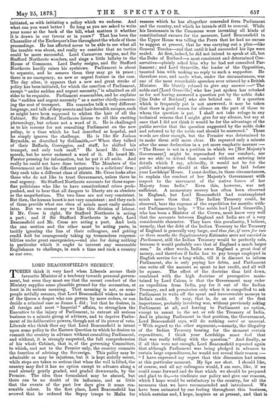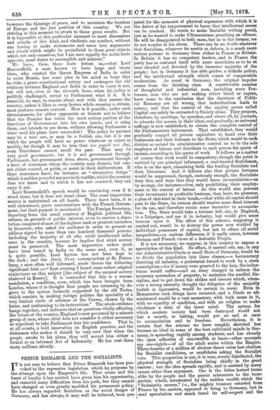LORD BEACONSFIELD'S SECRECY.
TORIES think it very hard when Liberals accuse their favourite Minister of a tendency towards personal govern- ment, but even they must see that the recent conduct of the Ministry supplies some plausible ground for the accusation, at least in its serious meaning. That meaning is not, as some people artfully assume, that Lord Beaconsfield wishes to make of the Queen a despot who can govern by mere orders, or can decide a criminal case as James L did ; but that he desires, in all foreign and most " Imperial " affairs, to strengthen the Executive to the injury of Parliament, to entrust all serious business to a minute group of advisers, and to deprive Parlia- ment of its deliberative powers, though not of its power of veto. Liberals who think thus say that Lord Beaconsfield is intent upon some policy in the Eastern Question to which he desires to commit the country in advance without consulting Parliament, and without, it is strongly suspected, the full comprehension of his whole Cabinet, that is, of the governing Committee, to which, and not to the Premier only, the country commits the function of advising the Sovereign. This policy may be admirable or may be injurious, but it is kept strictly secret, while steps are taken so serious that when the veil is lifted, the country may find it has no option except to advance along a road already gently graded, and graded downwards, by the Premier. The idea thus formulated may be absurd, but there can be no doubt of its influence, and as little that the events of the past few days give it some rea- sonable colour. In the first place, Lord Beaconsfield has avowed that he ordered the Sepoy troops to Malta for reasons which he has altogether concealed from Parliament and the country, and which he intends still to conceal. While his lieutenants in the Commons were inventing all kinds of constitutional excuses for the measure, Lord Beaconsfield in the Upper House was telling the Peers that he had no excuse to suggest at present, that he was carrying out a plan—like General Trochu—and that until it had succeeded his lips were sealed. At first, indeed, he did not intend to speak at all, but the Duke of Rutland—a most consistent and determined Con- servative—plainly asked him why he had not consulted Par- liament ; and Lord Granville, the leader of the Opposition, taunted him with making no reply to such a supporter. He therefore rose, and made what, under the circumstances, was one of the most remarkable speeches ever uttered by a British Minister. He bluntly refused to give any answer :—" The noble earl [Lord Granville] who has just spoken has rebuked us for not having answered a question put by the noble duke [the Duke of Rutland] who sits behind me. If a question which is frequently put is not answered, it may be taken that there is good reason for silence on the part of those to whom the question is put. I shall not take refuge in any technical reasons that I might give for my silence, but say at once that I did not think it would be for the advantage of the public service that the question suggested by the noble duke and referred to by the noble earl should be answered." Those words are clear enough, but the Premier was determined to to make them still more clear. He repeated only a minute after the same declaration in a yet more emphatic manner :- " The House is not in a position in which we [Her Majesty's Government] might be reproached for our conduct, nor are we able to defend that conduct without entering into details which I say, advisedly, it would not be for the public advantage should at this moment be laid before your Lordships' House. I must decline, in these circumstances, to explain the conduct of her Majesty's Government with respect to the movement of the native forces of her Majesty from India." Even this, however, was not sufficient. A momentary secrecy has often been observed in England, but 'Lord Beaconsfield had contemplated much more than that. The Indian Treasury could, he observed, bear the expense of the expedition for months with- out Parliamentary help. " The noble lord [Lord Granville,] who has been a Minister of the Crown, must know very well that the accounts between England and India are of a very considerable character. They have this peculiarity, I believe, namely, that the debt of the Indian Treasury to the Treasury of England is generally very large, and thus far, if even for two or three months the Supplementary Estimates were not carried in Parliament, still the Indian Treasury would be perfectly safe, because it would probably owe that of England a much larger sum." In other words, India owes England a great deal of money, and therefore if India has to pay troops employed in English service for a long while, till it is discreet to inform Parliament, she is only paying her debts, and Parliament can write off the amount so spent to her credit, and all will be square. The effect of the doctrine thus laid down, combined with the high doctrine of prerogative main- tained by Lord Cairns, is that the Government may order an expedition from India, pay for it out of the Indian Treasury, and ask permission only when it is compelled to ask Parliament to write off the spent and irrecoverable moneys to India's credit. It may, that is, do an act of the first importance, probably involving war, without previously asking Parliament at all, and leaving to Parliament no option, except to assent to the act or rob the Treasury of India. And in placing Parliament in that position, the Government, Lord Beaconsfield says, will do nothing outré or unusual. " With regard to the other argument,—namely, the illegality of the Indian Treasury bearing for the moment certain expenditure, I think your Lordships must feel that that was really trifling with the question." And finally, as if all this were not enough, Lord Beaconsfield repeated again that although Parliament was being pledged in advance to certain large expenditures, he would not reveal their reason :— " I have expressed my regret that this discussion had arisen at this particular moment. My lips are shut. I should like, of course, and all my colleagues would, I am sure, like, if we could come forward and do that which we should be prepared and glad to do,—to vindicate our policy and give our reasons, which I hope would be satisfactory to the country, for all the measures that we have recommended and introduced. We have been animated by one feeling throughout this business, which sustains and, I hope, inspires us at present, and that is to secure the blessings of peace, and to maintain the freedom of Europe and the just position of this country. We are striving at this moment to attain to those great results. But it is impossible at this particular moment to meet discussions and attacks of this kind, and vindicate our conduct, without our having to make statements and enter into arguments and details which might be prejudicial to those great objects which not only ourselves, but I am sure equally the noble lords opposite, must desire to accomplish and achieve." We have, then, these facts before us,—that Lord Beaconsfield, a man known to have large and viewy ideas, who created the Queen Empress of India in order to resist Russia, has some plan in his mind so large that he risks a grave constitutional outcry and endangers the old relations between England and India in order to carry it out, but will not, even at the eleventh hour, when his policy is publicly challenged, reveal to Parliament what it is. It is essential, he says, to remain silent, and with that answer the country, unless it likes to swap horses while crossing a stream, must perforce remain content. How is it possible, under such circumstances, for either opponents or friends not to believe that the Premier has taken the most serious portion of the functions of Government into his own hands, and is using them, and intends to use them, without allowing Parliament a voice until his plans have succeeded ? The policy he pursues may be a wise one, or may be a foolish one, but it is one which the people will have no power whatever to reject or modify, for though it may be true that vox populi vox Dei, even Providence cannot recall the past. That may 1 e very good government, but it is not government through Parliament, but government from above, government through a knot of statesmen whom the country may dismiss, but can- not either control, or guide, or assist in their deliberations. If these statesmen have, for instance, an " alternative design " which is neither peaceful nor precisely warlike, which the country does not know and to which it has not assented, they can carry it out. Lord Beaconsfield's speech would be convincing even if it stood alone, but it does not stand alone. The same impervious secrecy is maintained on all hands. There have been, it is well understood, grave conversations with the French Govern- ment, but their purport is unrevealed. The Foreign Secretary, departing from the usual courtesy of English political life, refuses, on grounds of public interest, even to receive a depu- tation composed of men of the highest rank or greatest eminence in literature, who asked for audience in order to present an address signed by more than two hundred thousand persons, including the majority of all who wield intellectual influ- ence in the country, because he implies that strict secresy must be preserved. The most imperative orders must have been issued in India to the same end, even if, as is quite possible, Lord Lytton has not been kept in the dark ; and the Daily News correspondent at St. Peters- burg, a man often well informed, sends thence the following significant hint ;—" Last evening I heard some rather original conjectures on this subject [the subject of the unusual secrecy -observed in Russia]. It is contended that this is a recom- mendation, a condition, even, which has been brought from London, where it is thought that people are returning by de- grees to the system formerly supported by the old Tories, which consists in making foreign politics the speciality of a very limited circle of advisers of the Crown, chosen by the latter, and conforming to its instructions." The whole evidence bangs together, and indicates that on questions vitally affecting the future of the country, England is now governed by a minute group of men, whose chief does not consider it either necessary or expedient to take Parliament into his confidence. That is, at all events, a bold innovation on English practice, and the statesman who makes it should be very sure that when the people awake to his plans, they will accord him either a formal or an informal Act of Indemnity. He has cost them many millions already.



































 Previous page
Previous page